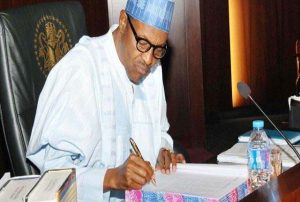President Muhammadu Buhari has assented to the Endangered Species Control of International Trade and Traffic Amendment Act 2016, earlier passed by the National Assembly.President Muhammadu Buhari has assented to the Endangered Species Control of International Trade and Traffic Amendment Act 2016, earlier passed by the National Assembly.
Sen. Ita Enang, the Senior Special Assistant to the President on National Assembly Matters (Senate), made this known while briefing State House correspondents on Friday in Abuja.
He said that the Act was one of the 10 bills forwarded by the National Assembly to the President, adding that with the approval, the President had completed work on all the bills sent to him for his consent.
“The President has assented to the bill sent by the National Assembly, The Endangered Species (Control of International Trade and Traffic) Amendment Act 2016.
“This is one of the 10 Bills that were forwarded by the National Assembly to Mr President and he has just assented to this, almost completing every action on all the Bills that were forwarded to him by the National Assembly.
“The intent of this amendment is to bring the penalty provisions in line with economic realities and to act as a deterrent or deter people from trafficking and trading in endangered species because endangered are preserved of the country.’’
The Presidential aide said the intent of the amendment was to bring the penalty provisions in line with economic realities and to serve as a deterrent to people trafficking in endangered species “because endangered species are the preserves of the country”.
According to him, the Act is to discourage trafficking in endangered species and will encourage the culture of the preservation of endangered species.
He added that with the assent, the President had increased the penalties for violations of the provisions in line with today’s realities.
The News Agency of Nigeria (NAN) reports that with the signing of the Act, President Buhari had so far signed 17 bills into law in 2016.
NAN recalls that the President in November signed eight bills into law which included the Prevention of Crime Amendment Act 2016, the National Crop Varieties and Livestock Breeds (Registration) Amendment Act 2016, Telecommunications and Postal Offences Amendment Act 2016, the National Agricultural Land Development Authority Amendment Act 2016.
Others are the Produce Enforcement of Export Standards Amendment Act 2016, the Agricultural and Rural Management Training Institute Amendment Act 2016, Bee Import Control and Management Amendment Act 2016, and Water Resources Amendment Act 2016.
The President also signed another eight bills into law, on Dec. 20.
The affected bills included National Judicial Institute Amendment Act, 2016 and Advertising Practitioners Registration Amendment Act, 2016.
Others are Utilities Charges Commission Amendment Act, 2016, Quality Surveyors Registration Amendment Act, 2016 and Small and Medium Scale Industries Development Agency Amendment Act, 2016.
Others are Treaty to Establish African Economic Community Relating to Pan African Parliament (Accession and Jurisdiction) Amendment Act, 2016, University of Abuja Amendment Act, 2016 and Chartered Institute of Stock Brokers Amendment Act, 2016.
Commenting on the signed bills, the Senate President, Sen. Bukola
Saraki, who had earlier met with the President behind closed door, assured that more progressive bills would be passed by the National Assembly in the coming years.
“It shows in part, what we have been able to do in the National Assembly and there are many more bills to come and the President is also responding to it.
“You are going to see more of that in 2017, there are a lot of bills lined up.
“For us in the Senate for example, in the last session just this last three months we did much more than what we did in the entire year.
“The National Assembly is settling down and as such you will see much more bill passed for the President to sign.”
Saraki, who joined President Buhari to perform the weekly 2-Raka’at Juma’at prayer at the Villa Mosque, described the fall of Sambisa forest as a great feat.
“This is a great progress from where we are before. If you look at where we were a year and half ago, the challenges we had in that area for us to recapture the place, I think is a great feat.
“It shows what we can do as a country when we have the commitment, purpose and the leadership required to do that.
“As we have done that in the North East, I believe the other issue before us is the fight against corruption, the economy, providing jobs, peace in the Niger Delta,’’ he said. (NAN)

